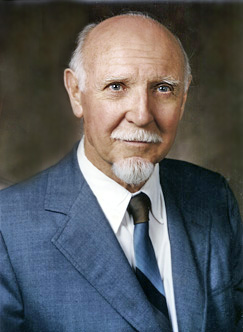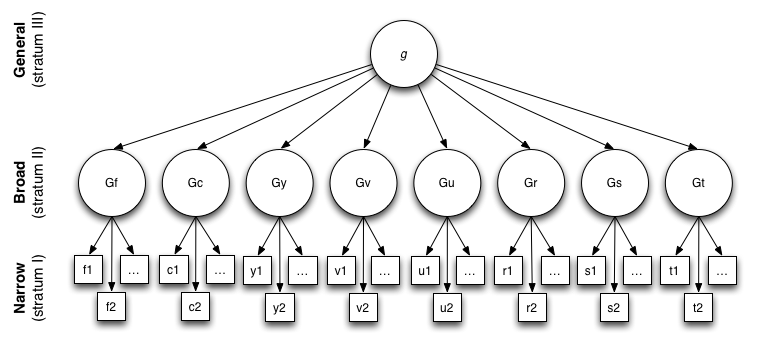|
Cattell–Horn–Carroll Theory
The Cattell–Horn–Carroll theory (commonly abbreviated to CHC), is a psychological theory on the structure of human cognitive abilities. Based on the work of three psychologists, Raymond B. Cattell, John L. Horn and John B. Carroll, the Cattell–Horn–Carroll theory is regarded as an important theory in the study of human intelligence. Based on a large body of research, spanning over 70 years, Carroll's Three Stratum theory was developed using the psychometric approach, the objective measurement of individual differences in abilities, and the application of factor analysis, a statistical technique which uncovers relationships between variables and the underlying structure of concepts such as 'intelligence' (Keith & Reynolds, 2010). The psychometric approach has consistently facilitated the development of reliable and valid measurement tools and continues to dominate the field of intelligence research (Neisser, 1996). The Cattell–Horn–Carroll theory is an integration of ... [...More Info...] [...Related Items...] OR: [Wikipedia] [Google] [Baidu] |
Raymond Cattell
Raymond Bernard Cattell (20 March 1905 – 2 February 1998) was a British-American psychologist, known for his psychometric research into intrapersonal psychological structure.Gillis, J. (2014). ''Psychology's Secret Genius: The Lives and Works of Raymond B. Cattell''. Amazon Kindle Edition. His work also explored the basic dimensions of personality and temperament, the range of cognitive abilities, the dynamic dimensions of motivation and emotion, the clinical dimensions of abnormal personality, patterns of group syntality and social behavior, applications of personality research to psychotherapy and learning theory,Cattell, R. B. (1987). ''Psychotherapy by Structured Learning Theory''. New York: Springer. predictors of creativity and achievement, and many multivariate research methodsCattell, R. B. (1966). (Ed.), ''Handbook of Multivariate Experimental Psychology''. Chicago, IL: Rand McNally. including the refinement of factor analytic methods for exploring and measuring these ... [...More Info...] [...Related Items...] OR: [Wikipedia] [Google] [Baidu] |
Charles Spearman
Charles Edward Spearman, FRS (10 September 1863 – 17 September 1945) was an English psychologist known for work in statistics, as a pioneer of factor analysis, and for Spearman's rank correlation coefficient. He also did seminal work on models for human intelligence, including his theory that disparate cognitive test scores reflect a single General intelligence factor and coining the term ''g'' factor. Biography Spearman had an unusual background for a psychologist. In his childhood he was ambitious to follow an academic career. He first joined the army as a regular officer of engineers in August 1883, and was promoted to captain on 8 July 1893, serving in the Munster Fusiliers. After 15 years he resigned in 1897 to study for a PhD in experimental psychology. In Britain, psychology was generally seen as a branch of philosophy and Spearman chose to study in Leipzig under Wilhelm Wundt, because it was a center of the "new psychology"—one that used the scientific method inst ... [...More Info...] [...Related Items...] OR: [Wikipedia] [Google] [Baidu] |
Psychology In The Schools, 47(7), 621-634
Psychology is the scientific study of mind and behavior. Psychology includes the study of conscious and unconscious phenomena, including feelings and thoughts. It is an academic discipline of immense scope, crossing the boundaries between the natural and social sciences. Psychologists seek an understanding of the emergent properties of brains, linking the discipline to neuroscience. As social scientists, psychologists aim to understand the behavior of individuals and groups.Fernald LD (2008)''Psychology: Six perspectives'' (pp.12–15). Thousand Oaks, CA: Sage Publications.Hockenbury & Hockenbury. Psychology. Worth Publishers, 2010. Ψ (''psi''), the first letter of the Greek word ''psyche'' from which the term psychology is derived (see below), is commonly associated with the science. A professional practitioner or researcher involved in the discipline is called a psychologist. Some psychologists can also be classified as behavioral or cognitive scientists. Some psycholog ... [...More Info...] [...Related Items...] OR: [Wikipedia] [Google] [Baidu] |
University Of Illinois Press
{{Illinois-univer ...
The University of Illinois Press (UIP) is an American university press and is part of the University of Illinois system. Founded in 1918, the press publishes some 120 new books each year, plus 33 scholarly journals, and several electronic projects. Strengths include ethnic and multicultural studies, Lincoln and Illinois history, and the large and diverse series ''Music in American Life.'' See also * Journals published by University of Illinois Presssee thfull Journals list as published in the University of Illinois Press website References External links * 1918 establishments in Illinois Book publishing companies based in Illinois Publishing companies established in 1918 Press Illinois Illinois ( ) is a U.S. state, state in the Midwestern United States, Midwestern United States. Its largest metropolitan areas include the Chicago metropolitan area, and the Metro East section, of Greater St. Louis. Other smaller metropolita ... [...More Info...] [...Related Items...] OR: [Wikipedia] [Google] [Baidu] |
Cross Battery Assessment
Cross-battery assessment is the process by which psychologists use information from multiple test batteries (i.e., various IQ tests) to help guide diagnostic decisions and to gain a fuller picture of an individual's cognitive abilities than can be ascertained through the use of single-battery assessments. The cross-battery approach (XBA) was first introduced in the late 1990s by Dawn Flanagan, Samuel Ortiz and Kevin McGrew. It offers practitioners the means to make systematic, valid and up-to-date interpretations of intelligence batteries and to augment them with other tests in a way that is consistent with the empirically supported Cattell–Horn–Carroll (CHC) theory of cognitive abilities.Flanagan, D. P., Ortiz, S. O., & Alfonso, V. C. (2007). Essentials of Cross Battery Assessment 2nd Edition. New Jersey: Wiley Three Foundational Sources of Information The XBA approach is a time efficient method to reliably measure a wider (or more in-depth but selective range) of cognitiv ... [...More Info...] [...Related Items...] OR: [Wikipedia] [Google] [Baidu] |
School Psychology
School psychology is a field that applies principles from educational psychology, developmental psychology, clinical psychology, community psychology, and behavior analysis to meet the learning and behavioral health needs of children and adolescents. It is an area of applied psychology practiced by a school psychologist. They often collaborate with educators, families, school leaders, community members, and other professionals to create safe and supportive school environments. They carry out psychological testing, psychoeducational assessment, intervention, prevention, counseling, and consultation in the ethical, legal, and administrative codes of their profession. Historical foundations School psychology dates back to the beginning of American psychology in the late 19th and early 20th centuries. The field is tied to both functional and clinical psychology. School psychology actually came out of functional psychology. School psychologists were interested in childhood behav ... [...More Info...] [...Related Items...] OR: [Wikipedia] [Google] [Baidu] |
Carroll Three Stratum Model Of Human Intelligence
Carroll may refer to: People * Carroll (given name) * Carroll (surname) * O'Carroll, also known as Carroll, a Gaelic Irish clan * Mac Cearbhaill, anglicised as Carroll, a Gaelic Irish clan * Charles Carroll Webster (1824-1893), American lawyer and politician Places Australia *Carroll, New South Wales United States *Carroll, Iowa *Carroll, Nebraska *Carroll, New Hampshire *Carroll, New York *Carroll, Ohio *Carroll, Texas * Carroll County (other), various * Carroll Plantation, Maine *Carroll Township (other), various *Carroll Valley, Pennsylvania *East Carroll Parish, Louisiana *East Carroll Township, Cambria County, Pennsylvania *West Carroll Parish, Louisiana *Mount Carroll, Illinois Education *Carroll College (Montana) *Carroll University, Waukesha, Wisconsin *John Carroll University, Cleveland, Ohio *Carroll Hall (University of Notre Dame), residence hall *Carroll School of Management, within Boston College Court cases *''R v Carroll'', Australian High Cou ... [...More Info...] [...Related Items...] OR: [Wikipedia] [Google] [Baidu] |
A Survey Of Factor-Analytic Studies
A, or a, is the first letter and the first vowel of the Latin alphabet, used in the modern English alphabet, the alphabets of other western European languages and others worldwide. Its name in English is ''a'' (pronounced ), plural ''aes''. It is similar in shape to the Ancient Greek letter alpha, from which it derives. The uppercase version consists of the two slanting sides of a triangle, crossed in the middle by a horizontal bar. The lowercase version can be written in two forms: the double-storey a and single-storey ɑ. The latter is commonly used in handwriting and fonts based on it, especially fonts intended to be read by children, and is also found in italic type. In English grammar, " a", and its variant " an", are indefinite articles. History The earliest certain ancestor of "A" is aleph (also written 'aleph), the first letter of the Phoenician alphabet, which consisted entirely of consonants (for that reason, it is also called an abjad to distinguish it fro ... [...More Info...] [...Related Items...] OR: [Wikipedia] [Google] [Baidu] |
G Factor (psychometrics)
The ''g'' factor (also known as general intelligence, general mental ability or general intelligence factor) is a construct developed in psychometric investigations of Cognitive skill, cognitive abilities and human intelligence. It is a variable that summarizes positive correlations among different cognitive tasks, reflecting the fact that an individual's performance on one type of cognitive task tends to be comparable to that person's performance on other kinds of cognitive tasks. The ''g'' factor typically accounts for 40 to 50 percent of the between-individual performance differences on a given cognitive test, and composite scores ("IQ scores") based on many tests are frequently regarded as estimates of individuals' standing on the ''g'' factor.Kamphaus et al. 2005 The terms ''Intelligence quotient, IQ, general intelligence, general cognitive ability, general mental ability'', and simply ''intelligence'' are often used interchangeably to refer to this common core shared by cogn ... [...More Info...] [...Related Items...] OR: [Wikipedia] [Google] [Baidu] |
Picture Of John L Horn
An image is a visual representation of something. It can be two-dimensional, three-dimensional, or somehow otherwise feed into the visual system to convey information. An image can be an artifact, such as a photograph or other two-dimensional picture, that resembles a subject. In the context of signal processing, an image is a distributed amplitude of color(s). In optics, the term “image” may refer specifically to a 2D image. An image does not have to use the entire visual system to be a visual representation. A popular example of this is of a greyscale image, which uses the visual system's sensitivity to brightness across all wavelengths, without taking into account different colors. A black and white visual representation of something is still an image, even though it does not make full use of the visual system's capabilities. Images are typically still, but in some cases can be moving or animated. Characteristics Images may be two or three- dimensional, such as a p ... [...More Info...] [...Related Items...] OR: [Wikipedia] [Google] [Baidu] |
Three-stratum Theory
The three-stratum theory is a theory of cognitive ability proposed by the American psychologist John Carroll in 1993.J. B. Carroll (1997), "The three-stratum theory of cognitive abilities" in D. P. Flanagan, J. L. Genshaft et al., ''Contemporary intellectual assessment: Theories, tests, and issues'', Guilford Press, New York, NY, USA, pp. 122-130. It is based on a factor-analytic study of the correlation of individual-difference variables from data such as psychological tests, school marks and competence ratings from more than 460 datasets. These analyses suggested a three-layered model where each layer accounts for the variations in the correlations within the previous layer. The three layers (strata) are defined as representing narrow, broad, and general cognitive ability. The factors describe stable and observable differences among individuals in the performance of tasks. Carroll argues further that they are not mere artifacts of a mathematical process, but likely reflect phy ... [...More Info...] [...Related Items...] OR: [Wikipedia] [Google] [Baidu] |
Fluid And Crystallized Intelligence
The concepts of fluid intelligence (''g''f) and crystallized intelligence (''g''c) were introduced in 1963 by the psychologist Raymond Cattell. According to Cattell's psychometrically-based theory, general intelligence (''g'') is subdivided into ''g''f and ''g''c. Fluid intelligence is the ability to solve novel reasoning problems and is correlated with a number of important skills such as comprehension, problem-solving, and learning. Crystallized intelligence, on the other hand, involves the ability to deduce secondary relational abstractions by applying previously learned primary relational abstractions. History Fluid and crystallized intelligence are constructs originally conceptualized by Raymond Cattell. The concepts of fluid and crystallized intelligence were further developed by Cattell and his former student John L. Horn. Fluid versus crystallized intelligence Fluid intelligence (''g''f) refers to basic processes of reasoning and other mental activities that depend on ... [...More Info...] [...Related Items...] OR: [Wikipedia] [Google] [Baidu] |



